Peak Denial About Peak Oil
Commodities / Crude Oil Sep 03, 2010 - 11:39 AM GMTBy: James_Quinn
 It is par for the course that with oil hovering between $70 and $80 per barrel Americans have continued to buy SUVs and Trucks at a rapid pace. Politicians don't have constituents screaming at them because gas is $4.00 per gallon, so it is no longer an issue for them. They need to focus on the November elections. It is no time to discuss a difficult issue that requires foresight and honesty. It is no time to tell the American public that oil will be over $200 a barrel within the next 5 years. Anyone who would go on CNBC today and declare that oil will be over $200 a barrel would be eviscerated by bubble head Bartiromo or clueless Kudlow. Bartiromo filled up her Escalade this morning for $2.60 a gallon, so there is no looming crisis on the horizon. The myopic view of the world by politicians, the mainstream media and the American public in general is breathtaking to behold. Despite the facts slapping them across the face, Americans believe cheap oil is here to stay. It is their right to have an endless supply of cheap oil. The American way of life has been granted by God. We are the chosen people.
It is par for the course that with oil hovering between $70 and $80 per barrel Americans have continued to buy SUVs and Trucks at a rapid pace. Politicians don't have constituents screaming at them because gas is $4.00 per gallon, so it is no longer an issue for them. They need to focus on the November elections. It is no time to discuss a difficult issue that requires foresight and honesty. It is no time to tell the American public that oil will be over $200 a barrel within the next 5 years. Anyone who would go on CNBC today and declare that oil will be over $200 a barrel would be eviscerated by bubble head Bartiromo or clueless Kudlow. Bartiromo filled up her Escalade this morning for $2.60 a gallon, so there is no looming crisis on the horizon. The myopic view of the world by politicians, the mainstream media and the American public in general is breathtaking to behold. Despite the facts slapping them across the face, Americans believe cheap oil is here to stay. It is their right to have an endless supply of cheap oil. The American way of life has been granted by God. We are the chosen people.
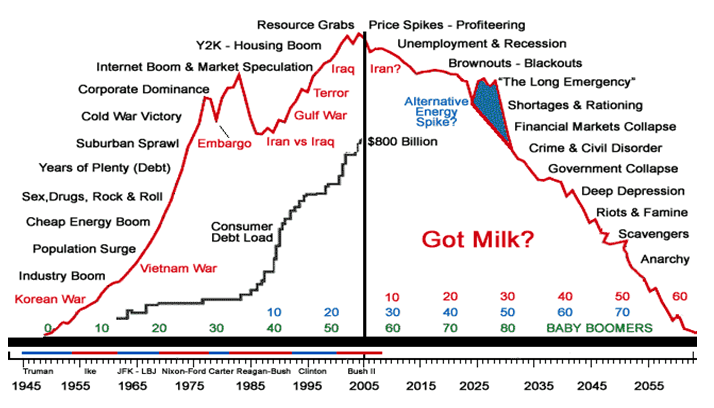
A funny thing happened on our way to permanent prosperity and unlimited cheap oil. The right to prosperity was yanked out from underneath us by the current Greater Depression. The worldwide economic downturn has masked the onset of peak cheap oil. Therefore, when it hits America with its full fury, it will be a complete surprise to the ignorant masses and the ignorant politicians who run this country. A Gallup Poll in August asked Americans about our most important problems. Where is the concern about future energy supplies? It isn't on the radar screens of Americans. They are probably more worried about whether The Situation will hook up with Snookie on the Jersey Shore reality show.
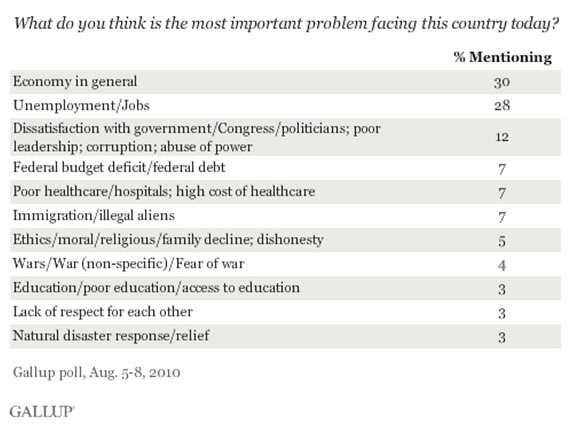
It is not surprising that the American public, American politicians, and the American media don't see the impending crisis. The organizations that have an interest in looking farther than next week into the future have all concluded that the downside of peak oil will cause chaos throughout the world. The US Military, the German Military, and the UK Department of Energy have all done detailed studies of the situation and come to the same conclusions. Social chaos, economic confusion, trade barriers, conflict, food shortages, riots, and war are in our future.
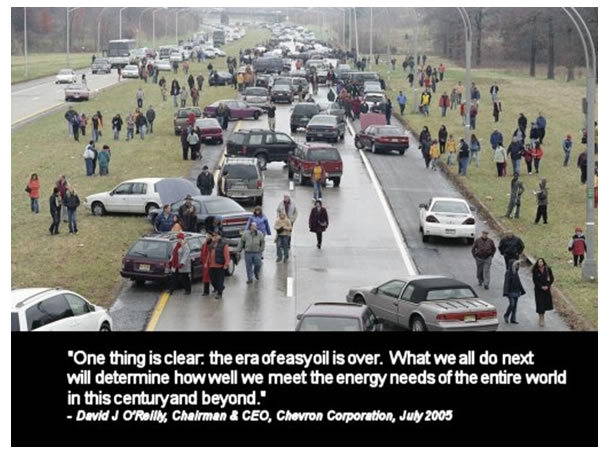
http://www.acus.org/docs/051007-Hirsch_World_Oil_Production.pdf
The U.S. was warned in 2005. Its own Department of Energy commissioned a report by Robert Hirsch to examine peak oil and its potential consequences to the US. The introduction stated:#
"The peaking of world oil production presents the U.S. and the world with an unprecedented risk management problem. As peaking is approached, liquid fuel prices and price volatility will increase dramatically, and, without timely mitigation, the economic, social, and political costs will be unprecedented. Viable mitigation options exist on both the supply and demand sides, but to have substantial impact, they must be initiated more than a decade in advance of peaking."
The main conclusions reached by the experts who worked on this report were:
- World oil peaking is going to happen, and will likely be abrupt. World production of conventional oil will reach a maximum and decline thereafter.
- Oil peaking will adversely affect global economies, particularly the U.S. Over the past century the U.S. economy has been shaped by the availability of low-cost oil. The economic loss to the United States could be measured on a trillion-dollar scale. Aggressive fuel efficiency and substitute fuel production could provide substantial mitigation.
- The problem is liquid fuels for transportation. The lifetimes of transportation equipment are measured in decades. Rapid changeover in transportation equipment is inherently impossible. Motor vehicles, aircraft, trains, and ships have no ready alternative to liquid fuels.
- Mitigation efforts will require substantial time. Waiting until production peaks would leave the world with a liquid fuel deficit for 20 years. Initiating a crash program 10 years before peaking leaves a liquid fuels shortfall of a decade. Initiating a crash program 20 years before peaking could avoid a world liquid fuels shortfall.
- It is a matter of risk management. The peaking of world oil production is a classic risk management problem. Mitigation efforts earlier than required may be premature, if peaking is long delayed. On the other hand, if peaking is soon, failure to initiate mitigation could be extremely damaging.
- Economic upheaval is not inevitable. Without mitigation, the peaking of world oil production will cause major economic upheaval. Given enough lead-time, the problems are soluble with existing technologies. New technologies will help, but on a longer time scale.
The Hirsch Report clearly laid out the problem. It urged immediate action on multiple fronts. It is now 5 years later and absolutely nothing has been done. In the meantime, it has become abundantly clear that worldwide oil production peaked between 2005 and 2010. The Hirsch Report concluded we needed to begin preparing 20 years before peak oil in order to avoid chaos. We are now faced with the worst case scenario.
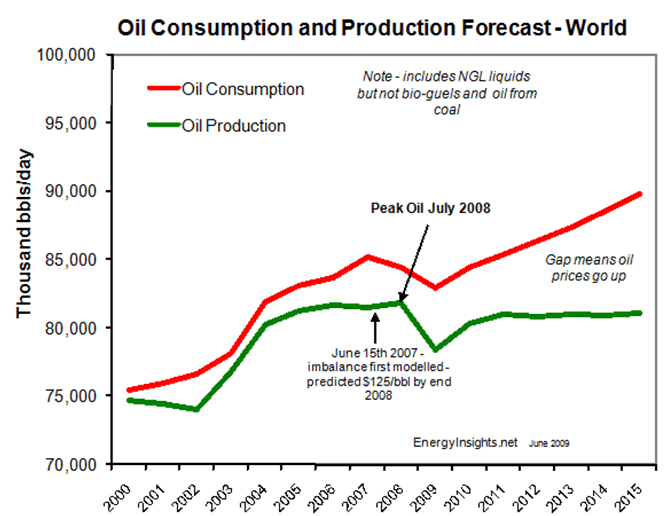
http://www.fas.org/man/eprint/joe2010.pdf
The US Military issued a Joint Operating Environment report earlier this year. They have no political motivation to sugarcoat or present a dire picture. This passage is particularly disturbing:
A severe energy crunch is inevitable without a massive expansion of production and refining capacity. While it is difficult to predict precisely what economic, political, and strategic effects such a shortfall might produce, it surely would reduce the prospects for growth in both the developing and developed worlds. Such an economic slowdown would exacerbate other unresolved tensions, push fragile and failing states further down the path toward collapse, and perhaps have serious economic impact on both China and India. At best, it would lead to periods of harsh economic adjustment. To what extent conservation measures, investments in alternative energy production, and efforts to expand petroleum production from tar sands and shale would mitigate such a period of adjustment is difficult to predict. One should not forget that the Great Depression spawned a number of totalitarian regimes that sought economic prosperity for their nations by ruthless conquest.
Here is the summary of their analysis:
To generate the energy required worldwide by the 2030s would require us to find an additional 1.4 MBD every year until then.
During the next twenty-five years, coal, oil, and natural gas will remain indispensable to meet energy requirements. The discovery rate for new petroleum and gas fields over the past two decades (with the possible exception of Brazil) provides little reason for optimism that future efforts will find major new fields.
At present, investment in oil production is only beginning to pick up, with the result that production could reach a prolonged plateau. By 2030, the world will require production of 118 MBD, but energy producers may only be producing 100 MBD unless there are major changes in current investment and drilling capacity.
By 2012, surplus oil production capacity could entirely disappear, and as early as 2015, the shortfall in output could reach nearly 10 MBD.
Energy production and distribution infrastructure must see significant new investment if energy demand is to be satisfied at a cost compatible with economic growth and prosperity. Efficient hybrid, electric, and flex-fuel vehicles will likely dominate light-duty vehicle sales by 2035 and much of the growth in gasoline demand may be met through increases in biofuels production. Renewed interest in nuclear power and green energy sources such as solar power, wind, or geothermal may blunt rising prices for fossil fuels should business interest become actual investment. However, capital costs in some power-generation and distribution sectors are also rising, reflecting global demand for alternative energy sources and hindering their ability to compete effectively with relatively cheap fossil fuels. Fossil fuels will very likely remain the predominant energy source going forward.
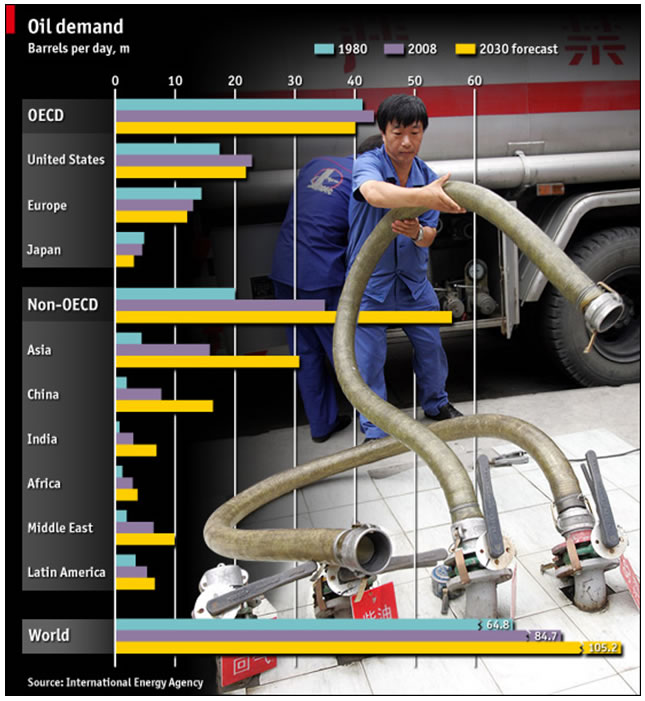
Just this week, the German magazine Der Spiegel obtained a confidential study about peak oil that was done by the German military. According to the German report, there is "some probability that peak oil will occur around the year 2010 and that the impact on security is expected to be felt 15 to 30 years later." The major conclusions of the study as detailed in Der Spiegel are as follows:
- Oil will determine power: The Bundeswehr Transformation Center writes that oil will become one decisive factor in determining the new landscape of international relations: "The relative importance of the oil-producing nations in the international system is growing. These nations are using the advantages resulting from this to expand the scope of their domestic and foreign policies and establish themselves as a new or resurgent regional, or in some cases even global leading powers."
- Increasing importance of oil exporters: For importers of oil more competition for resources will mean an increase in the number of nations competing for favor with oil-producing nations. For the latter this opens up a window of opportunity which can be used to implement political, economic or ideological aims. As this window of time will only be open for a limited period, "this could result in a more aggressive assertion of national interests on the part of the oil-producing nations."
- Politics in place of the market: The Bundeswehr Transformation Center expects that a supply crisis would roll back the liberalization of the energy market. "The proportion of oil traded on the global, freely accessible oil market will diminish as more oil is traded through bi-national contracts," the study states. In the long run, the study goes on, the global oil market, will only be able to follow the laws of the free market in a restricted way. "Bilateral, conditioned supply agreements and privileged partnerships, such as those seen prior to the oil crises of the 1970s, will once again come to the fore."
- Market failures: The authors paint a bleak picture of the consequences resulting from a shortage of petroleum. As the transportation of goods depends on crude oil, international trade could be subject to colossal tax hikes. "Shortages in the supply of vital goods could arise" as a result, for example in food supplies. Oil is used directly or indirectly in the production of 95 percent of all industrial goods. Price shocks could therefore be seen in almost any industry and throughout all stages of the industrial supply chain. "In the medium term the global economic system and every market-oriented national economy would collapse."
- Relapse into planned economy: Since virtually all economic sectors rely heavily on oil, peak oil could lead to a "partial or complete failure of markets," says the study. "A conceivable alternative would be government rationing and the allocation of important goods or the setting of production schedules and other short-term coercive measures to replace market-based mechanisms in times of crisis."
- Global chain reaction: "A restructuring of oil supplies will not be equally possible in all regions before the onset of peak oil," says the study. "It is likely that a large number of states will not be in a position to make the necessary investments in time," or with "sufficient magnitude." If there were economic crashes in some regions of the world, Germany could be affected. Germany would not escape the crises of other countries, because it's so tightly integrated into the global economy.
- Crisis of political legitimacy: The Bundeswehr study also raises fears for the survival of democracy itself. Parts of the population could perceive the upheaval triggered by peak oil "as a general systemic crisis." This would create "room for ideological and extremist alternatives to existing forms of government." Fragmentation of the affected population is likely and could "in extreme cases lead to open conflict."
Even the International Energy Agency, which has always painted a rosy picture of the future, has even been warning about future shortages due to lack of investment and planning.
http://www.worldenergyoutlook.org/docs/weo2009/WEO2009_es_english.pdf
Americans think that the discovery of oil on our soil in 1859 has entitled us to an endless supply. It is not so. We account for 4.3% of the world's population but consume 26% of the world's oil. As China, India and the rest of the developing world become economic powerhouses, they will consume more and more of the dwindling supply of easily accessible oil. As the consumption curve continues upwards, the production curve will be flat. The result will be huge spikes in prices. It will not be a straight line, but prices will become progressively higher. As the studies referenced above have concluded, the result will be economic pain, social chaos, supply wars, food shortages, and a drastic reduction in lifestyles of Americans. They won't see it coming, just like they didn't see the housing collapse coming or the financial system collapse coming. They'll just keep filling up those Escalades until the pump runs dry.

Join me at www.TheBurningPlatform.com to discuss truth and the future of our country.
By James Quinn
James Quinn is a senior director of strategic planning for a major university. James has held financial positions with a retailer, homebuilder and university in his 22-year career. Those positions included treasurer, controller, and head of strategic planning. He is married with three boys and is writing these articles because he cares about their future. He earned a BS in accounting from Drexel University and an MBA from Villanova University. He is a certified public accountant and a certified cash manager.
These articles reflect the personal views of James Quinn. They do not necessarily represent the views of his employer, and are not sponsored or endorsed by his employer.
© 2010 Copyright James Quinn - All Rights Reserved
Disclaimer: The above is a matter of opinion provided for general information purposes only and is not intended as investment advice. Information and analysis above are derived from sources and utilising methods believed to be reliable, but we cannot accept responsibility for any losses you may incur as a result of this analysis. Individuals should consult with their personal financial advisors.
James Quinn Archive |
© 2005-2022 http://www.MarketOracle.co.uk - The Market Oracle is a FREE Daily Financial Markets Analysis & Forecasting online publication.



